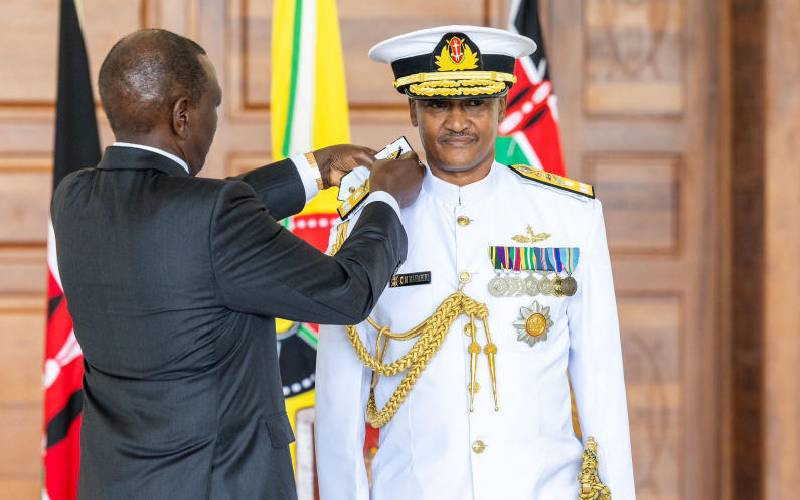By Peter Ndoria
The news reverberated across the world like an earth tremor: 70-year-old South African President Jacob Zuma had married his fourth, eh, First Lady.
The self-confessed polygamist has been married six times and is said to have over 20 children bearing his famous name — never mind that the virile anti-apartheid warrior spent ten years of his life behind bars, and several more in exile!
In the tight strictures of a political career in a modern country, few would dare come out and endorse a practice that others consider ‘primitive’, ‘out-dated’ and ‘unfaithful’.
Yet if one were to bear in mind the number of politicians caught in illicit affairs, the list would be mind-boggling. From the infamous Profumo Affair that almost brought down the British government in 1963 to JF Kennedy’s rumoured liaisons with Marylyn Monroe and big names like Arnold Schwarzenegger, former British Prime Minister John Major, 2004 American Presidential running mate John Edwards, not forgetting President Bill Clinton, it is a randy male world.
Could it, perhaps, be that man was not designed to be monogamous?
At 70, Zuma’s last child is not yet three years old. Closer home, a veteran politician who passed on recently got his last-born child just before turning 80 years. Assuming that both men became mature enough to get children in their late teens, this would mean that they were able to sire children for almost six decades.
Contrast this with the women who, in their late teens, are advised not to be in a hurry to get children. In today’s world where most women go to school and get employed, it means that they have to wait until they are at least 25 years old to start a family — assuming they have a man. By the time they go past their mid 30s — given lifestyle diseases, career advancement and work-related stress — many are advised not to conceive anymore for health reasons. Then menopause sets in, meaning that in essence, a 21st Century woman has about 15 years of reproductive health — translating, at best, to about five children.
So, why would nature equip a man with more than twice the number of reproductive years as that of a woman if the intention were for a man to stay with one woman for his entire life?
“There is nothing natural about monogamy. In the animal kingdom, very few species are monogamous. Even those that live together socially are not sexually exclusive,” Leon, a Zoology student, says.
Monogamy is practised for various reasons. In today’s world, the social reasons rank high with the need for a couple to come together and pool their resources to support their offspring. Marital union also offers a basic unit — the family — that is considered the building block of a stable society.
This portends the practise of sexual exclusivity among partners and, by and large, the perpetuation of their offspring in a more secure world. It is easier to provide education, medical cover, shelter and other basics in such an arrangement.
Religion has also played a role.
“Being able to commit to one woman for your entire married life is the ultimate confirmation of a man’s maturity and sense of responsibility,” Ken Muli, who has been married for two years, says. He is also staunch in his religious belief, which decrees that he only marries one wife.
Not that religion has not had its fair share of polygamous unions. The wise King Solomon is quoted to have been ‘blessed’ with 700 wives and 300 concubines, including foreign princesses such as Pharaoh’s daughter and women of Moab, Ammon, Sidon and of the Hittites.
Stay informed. Subscribe to our newsletter
Earlier, when Sarah saw that she could not bear a child for Abraham, she persuaded him to sleep with Hagar, her maidservant. Sarah and Abraham would go on to be the parents of the nation of Israel in the scriptures.
Edwin, a divorcee in his early 40s, believes that what we have now is ‘monogamy plagued by wanton acts of adultery’, quoting the many incidences that are the fodder of radio talk shows — married women going on and on about their detached absentee husbands and how that gap has since been filled by ‘toy boys’ and, conversely, men recounting their escapades with their ‘clandes’, away from their ‘nagging’ spouses.
In an individualistic world where divorce is easier to get, Edwin contends that a man who has married two or three times is no different from his ancestor who had three wives. This practice of having just one mate at a time or ‘serial monogamy’, where you marry, divorce and remarry is a more common façade.
“In those days, people worked on their misunderstandings, so walking away from your spouse was almost unheard of. Marriage appealed to higher social ideals, not the selfish ‘soap opera’ kind of unrealistic love that we regard so highly. If you fancied a girl you brought her home to be your second wife, so long as you could provide for the entire household,” he offers.
That ability to provide is the cornerstone of marriage. It would be foolhardy to have two wives if you cannot provide for one.
Monica, a fresh graduate who says she will never get married, herself points out that she sees nothing wrong with polygamy so long as the man in question is a ‘real’ man.
“The problem is, most of these jokers jumping from one wife to another cannot even provide for or satisfy one woman. You surely cannot expect your wife to be okay with you getting a second wife when you do not meet her physical, emotional and material needs,” she says.
Ahmed Atute Mire sees nothing wrong with polygamy, adding that it is good for a man to have variety. He believes that much as there is nothing wrong with being faithful to one woman, it is not possible to be faithful, terming it ‘unrealistic’, the reason polygamy ought to be accommodated.
“Why cheat on your wife when you can do things legally? We are African, my friend, and we have always been polygamous,” he says.
His religion also allows him to have more than one wife, a point he attributes to the realisation that man will need more than one wife and that it is wrong to commit adultery.
“My religion allows me to have up to four wives because four is manageable. You don’t just marry women na hauna kitu (you don’t have a dime). You also need to treat them equally — don’t favour any,” Mure explains.
But Njoki, a young single banker says that’s rubbish: “I can’t be a first or second wife. I can only be ‘the’ wife. I would rather have him cheat clandestinely than know he is with another woman. It would make me feel inadequate — like I can’t satisfy him...”
So there it is. Deep down, Njoki knows that her man, like all men, will at some point want another woman.
 The Standard Group Plc is a
multi-media organization with investments in media platforms spanning newspaper
print operations, television, radio broadcasting, digital and online services. The
Standard Group is recognized as a leading multi-media house in Kenya with a key
influence in matters of national and international interest.
The Standard Group Plc is a
multi-media organization with investments in media platforms spanning newspaper
print operations, television, radio broadcasting, digital and online services. The
Standard Group is recognized as a leading multi-media house in Kenya with a key
influence in matters of national and international interest.
 The Standard Group Plc is a
multi-media organization with investments in media platforms spanning newspaper
print operations, television, radio broadcasting, digital and online services. The
Standard Group is recognized as a leading multi-media house in Kenya with a key
influence in matters of national and international interest.
The Standard Group Plc is a
multi-media organization with investments in media platforms spanning newspaper
print operations, television, radio broadcasting, digital and online services. The
Standard Group is recognized as a leading multi-media house in Kenya with a key
influence in matters of national and international interest.





